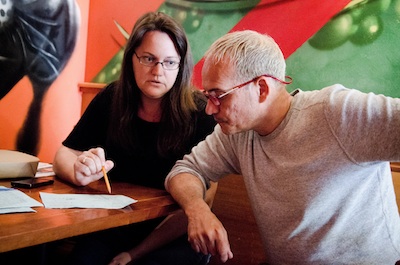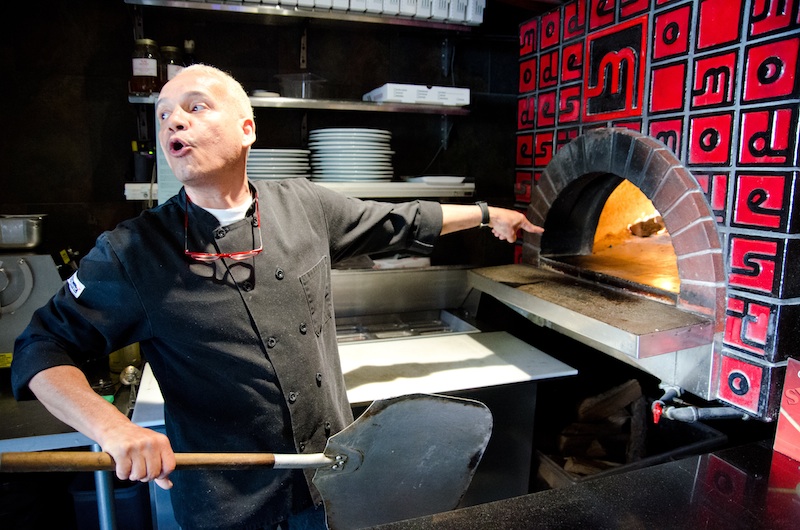Hector Diaz’s hair stands up from his head in tufts like the sticky down of a newborn chick. He’s not balding, exactly, but no one would call his a full head of hair. A few weeks ago, he bleached it blonde.
He’s Puerto Rican. Bleach-blonde is not his natural hair color.
Ask him why he changed his hair color; he avoids the question. Press the matter; he elaborates. “Because I’m crazy,” he says, or rather, emotes, his mouth stretching long, his hands framing his face, his speech deeply accented. “Here and there, you might see me purple. That’s the kind of personality I am.”
Fire starter
When Diaz was arrested on assault charges a couple of days after Christmas, he was not blonde. That’s easy to tell from the police report: “Hair color: BLK,” it reads.
It continues: He stands 5 feet, 7 inches, weighs 150 pounds. He’s 54 years old and has a tattoo of a dolphin on his left elbow. It lists him as the owner of Salsa’s, although he also owns the downtown restaurants Modesto, Chorizo and Bomba.
In April, a Buncombe County district judge convicted him of “assault on a female.” That female was a city parking attendant, according to the police report. He hit her on the head as she was noting the location of his car in her handheld computer, according to news reports. The judge sentenced him to probation for a year, and community service, which he performs weekly at Brother Wolf Animal Rescue, a task that makes him feel good, he says. But he squirms at the upcoming, court-ordered psychological evaluation and anger-management classes.
It’s been about six weeks since Diaz was sentenced, and I’ve been following him around for three weeks or so, trying to reconcile the successful restaurant owner with the “offender,” as the police report lists him. In our time together, he’s remained in near-constant motion. Watching him is like watching an air dancer outside a car lot.
Now, at Dobrá Tea, I see him at rest for the first time. We’re sitting in the back of the shop where you’re supposed to remove your shoes and sit on floor pillows. Diaz takes off his sneakers to reveal crisp but inexpensive white cotton athletic socks. His toes point ceilingward as he reposes on one of the cushions, legs outstretched in front of him. He drinks his iced tea slowly. My glass is empty long before his.
Over the past couple of weeks, I’ve asked Diaz about the same topics over and over again, trying to understand his perspective. I bring the conversation back around to the parking attendant. Again, he seems remorseful, although also buoyant.
“I made a mistake to react,” he says. “I’m paying for it. Oh my, I’m paying for it.”
Each time I have asked the question, he mentions paying. How, I ask, how are you paying? “I’ve lost a lot of friends,” he says.
He wants to move forward, he says, so he stays focused on solving problems at his restaurants. “You know how many fires we got everyday?” he asks. “This business is all about fires. Sometimes I feel like a fireman.”
He faces the day-to-day conflagrations of scheduling and deliveries, as well as long-term tasks: He’s redecorating Modesto and Chorizo and launching expanded hours and outdoor seating at Bomba, while creating an organic farm in Leicester to provide produce for the restaurants and a home for his family of five.
It’s not just business, though, that gets heated. “Me myself, I start a lot of fires,” he admits.
Husband
One morning, I drive to the Diaz’s Leicester farm. I have been there before with Diaz: He’s given me the grand tour. He’s pointed out the fields of lettuce, beets, squash and garlic that separate the newly built farmhouse from the road.
He has shown me his dozens of chickens, running about on a grassy hillside — Rhode Island Reds and Comets, all except for one, anyway. A yellow hen has moved over from a neighbor’s house.
But today, Diaz doesn’t know I’m coming. I’m there to see his wife, Aimee Diaz, about whom I know very little.

When I get out of my car, she is already beside me. I didn’t see her walk up; she’s just there all of a sudden in weathered work boots and a cable knit sweater. Her hair is slung into a ponytail. She looks like Helen of Troy, I think, and wonder why that image comes to mind. Then I notice she’s wearing a thin headband of braided, gold-colored elastic that looks vaguely Grecian. Maybe that’s it.
Her age is tough to guess. I would believe any number she would tell me. Later, she says she’s 38.
For four days, Aimee has been overseeing the family’s move from a rental house to the farm, unpacking while keeping an eye on her three sons, ages 3, 7 and 9. It’s been hectic, she says, but even so, the place looks put together. The throw pillows are already arranged on the sofas.
We walk up to the large greenhouse, which perches on a hill behind the small residence. Aimee slowly pushes dirt from a trowel with her fingernails while we talk. “What I think is most fascinating about Hector is that everybody has their ideas about him,” she says. “It used to be frustrating, but I don’t find it frustrating anymore.”
Aimee met Hector 16 years ago through a mutual friend. They connected at LEAF in 1997, dancing to Latin music. “The Latin community here, at that time, was really small,” Aimee says — her father is Latino, her mother is British. “There weren’t a lot of people who knew how to dance.”
But the dancing didn’t lead to romance. At least, not right away. Aimee worked for Hector when he owned Zambra. After she took a job at Tryon Distributing, he became her client. In 2000, they bonded over a wine encyclopedia; Aimee considers that their first date. They started a family together in 2004.

“But you didn’t come here for a love story,” she says. And she’s right. Since 2010, Hector has been arrested three times for assault: Aimee in 2010, his adult son (Aimee’s stepson), Phoenix Wolf, in 2011, and the parking attendant in 2012, according to the Asheville Police Department.
“I have five children,” Aimee says (counting her three sons and two step-children). “We’re working really hard to address his temper, and I don’t want us to take three steps back right now. I have to focus on a solution.”
It’s not just her family’s happiness she’s thinking about, she explains. The Diaz’s businesses employ abotu 100 people. “They count on us to keep it together and work hard and to provide a place for their success,” she says. “You know that analogy with the sticks? If you have one stick, it breaks if you put pressure on it. But when you put all the sticks together, you can’t even bend them. That’s where our focus has to be as a community.”
For the charges listed above, Hector has been sentenced in the most recent case. The other ones were dropped eventually.
In April, Aimee did not accompany him to court for sentencing — “That was his thing,” she says — but she did iron a shirt for him that morning, and she admires the judge who sentenced him.
Hector is nervous about his upcoming trip to the psychologist and his anger management course; Aimee thinks it will be good for him. “The only reason you see a man and a woman sitting on a park bench when they’re 80 is because that woman and that man dealt with the nastiest parts of each other,” she says. “That’s a choice, and it’s a strong choice, and it’s a hard choice.”
Islander, drug dealer, beach bum, aid worker
When I ask Aimee about Hector’s past, she mentions his “lives” as a way of describing it. “He has done it all,” she says.
The chronology is challenging. It would take pages to lay it all out. This fact hasn’t been lost on Hector; he wants to write a book.
Hector was born in a field near the mountain town of Cayey, Puerto Rico. His 14-year-old mother delivered him in hiding; she was worried her brothers would kill the baby because his father had come up the mountain from the city and seduced her. “My uncles were like, ‘If that guy comes up here, we’ll chop his head,’ Diaz says. “These guys were in the United States Army. They went to Korea. They went to Vietnam. Pretty tough.”
His aging grandparents raised him; his mother fled to New York shortly after his birth. He spent most of his time playing sports — boxing, baseball or basketball — or looking for ginger root and cinnamon bark in the jungle. He made fritters and sold them outside the baseball stadium, saving toward a plane ticket to follow his mother and escape his uncles. “They hit me like a man at the age of 5 or 6,” he says. “Bam! I would fly to the other side of the room.”
When he arrived in New York City at age 12, he lived with his aunt and washed dishes to make money. By the time he was 17, he was turning a fast trade in marijuana, he says, on the Lower East Side. “I had the most beautiful clothes,” he sighs.
The dangers of that lifestyle sent him looking for a career change. He still has a bullet in his leg, a memento from a girlfriend. “She was jealous,” he says.
Hector left New York after landing in court too many times. He served probation in Miami, where he was a self-declared “beach bum” for a while.
In yet another life, Hector traveled around Africa and South America with the now-defunct nonprofit Atlas, he says. The group trained him to teach food safety in impoverished areas. The people he met taught him recipes while they worked, which he lodged in his mind to use later on.
Waiter, entrepreneur
Hector’s life in Asheville started in The Market Place. He had worked in kitchens in New York and Miami, but here, he took a job as a server instead. His position didn’t stop him from talking about recipes, recalls Mark Rosenstein, who founded the restaurant in 1979 and owned it until 2009. “He was always talking about food and food ideas, even though he was not in the kitchen,” Rosenstein says. “Specifically, we used a spice that — it kills me I’ve lost the recipe — we called cohiba spice, and it was based on coffee and chocolate.”
Business was also on Hector’s mind. “We talked a lot about it,” Rosenstein says. “I think he knew from the get-go that waiting tables at The Market Place was a way station on to other things that he wanted to do.”
In 1994, when much of downtown was still boarded up, Hector opened Salsa’s as a burrito counter; the dining room expansion came a few years later. Patrons waited in a line down the block to buy his food, even though there was no place to sit down and eat it. “Everybody would go in and get the food to take out and take back to their office,” says Pat Whalen, who directs Public Interest Projects, an investment group that helped Salsa’s expand in its early days. “Whatever you ordered was going to be amazing.”
Occasionally, when Whalen talks about Hector, he laughs loudly — I think the term for it is a guffaw. He’s amused, surely, but maybe uncomfortable, too. His relationship with Hector has been complicated. (“We’re friends,” Hector says. “We’re not like friends-friends-friends.”)
Hector also opened Zambra and a hot sauce factory on Lexington Avenue in partnership with PIP, which offers financial assistance to local entrepreneurs. Each business gets a different deal based on its needs (PIP has worked with Malaprop’s, Laughing Seed, Fine Arts Theatre and others).
In Hector’s case, PIP owned the businesses, but Hector could purchase them by generating profit. But in the early-2000s, the two split: PIP kept Zambra; Hector kept Salsa’s.
“Entrepreneurs typically have a rare and intense sort of energy,” Whalen says. “We invested in them because we perceived that they did whatever their business does very well, had a gift for it, had a gift they wanted to share with the local population. … That gift for providing the food or the books or the art, whatever, is just this really powerful force that gives the business basic strength. All the people we’ve invested in, including Hector, are good people trying to do the right thing, for the most part.”
Salsa man
Hector doesn’t drink coffee, he says, but he moves about Mountain Foods like a person in a highly caffeinated state. He regularly comes into the wholesale produce supplier at the WNC Farmers Market like the white tornado from the Mr. Clean commercials, says Ron Ainspan, who owns the business, along with the Fresh Quarter fruit stand in the Grove Arcade and West Village Market.
Hector gives Ainspan peck on the lips. “He helped me be who I am today, and for that, I love him,” Hector says. “He gave me my first food without a penny down.”
Hector’s tone changes as he takes the conversation into business matters. “Alright papa,” he says, and begins listing the items he’s come to buy: cremini and shiitake mushrooms, poblano peppers, juicing oranges — Florida-grown only, nothing from South America. Hector says he likes to keep business in the U.S.
“When he comes into the warehouse, he can basically use my whole staff to get his orders,” Ainspan says with a laugh.
After 20 years of business, he doesn’t mind Hector’s bustle, and anyway, he’s gotten used to it. “I think that energy is real,” he says. “I would say it’s definitely changeable, so today’s excitement might be tomorrow’s discard.”
What does he mean by that? Sometimes Hector creates a bigger project than he can sustain. In the late ’90s, Hector contracted with local pepper farmers to grow habaneros and jalapeños for Hector’s Sauces. In 2000, the Citizen-Times reported that he was buying 90,000 pounds of peppers a year.
He couldn’t process all the peppers right away, and some of them required aging, so he stored them at Ainspan’s warehouse. “He’d come in and take some, but there would be a lot left over,” Ainspan says. “One time, I got a call from a customer saying that their broccoli tasted a little spicy. So I found out that somebody had racked up a pallet of hot peppers above where the broccoli was, and the peppers had been there long enough to start dripping.”
Hector plans to revive the sauce company one day. He recently dug out the old logos and hung them on the wall of his business office on Wall Street. The anthropomorphic jalapeños and habaneros remind him of the work he wants to do next. He still has dried habaneros, dated 1998, in storage. They get better with age, he explains.
Offender
At Mountain Foods, Hector shows off for me. He knows where all the vegetables and herbs are kept. He poses for a cheesy picture with a stuffed honey bear. He greets the staff by name. He’s even more theatrical than usual.
I ask Ainspan if Hector could be trying to manipulate me. “I don’t think Hector is faking it,” Ainspan says. “I think the energy is real.”
But not everyone agrees.
Pamela Irions was the victim of the December assault for which Hector was convicted. She can’t talk about the incident in the context of her job, she says. She doesn’t want to get in trouble with her employer. But she feels OK talking about it as part of her personal life.
We stand on the sidewalk and talk while she smokes a cigarette.
“It’s all a front to me,” she says. “He’s trying to put off this persona that he’s a good person. … I just don’t believe it.”
Before the December incident, Irions had never heard of Hector. Now, she calls him by his first name, even though the court prohibits the two from speaking. But he remains mysterious to her. “What kind of person is he really?” she says.
A group of police officers in bicycle gear walk by. They nod and smile at Irions, and she returns their greeting. She feels safe, generally, she says. She likes the interaction with the people she meets on the job, and she believes in the community’s power to balance wrong actions with right ones. “It’s kind of like karma,” she says. “He had news crews in his face and stuff. It’s like, ‘Is this not embarrassing for you?’”
What seems most personal about the attack, the actual violence, she meets with detachment. “What happened that day I do not feel had anything to do with me,” she says.
She’s pleased with the outcome of the trial. Plus, she has her own way of “balancing the scale.” Tourists often ask her where to eat. “I say, ‘Let me shorten your list.’”
Chef
In the kitchen of Modesto, Hector bounces a long, springy garlic scape, makes lewd gestures with a bamboo shoot, offers samples of guava. He seems frenetic — until he picks up a knife the size of his forearm and takes to a tiny strawberry. He turns all his energy to his task. For a moment, he’s focused, and the fruit falls in two.
His operations manager, Jennifer Mears slips into the kitchen and updates him about a phone call.

People ask Mears how she has endured working for Hector for almost seven years now. “They don’t know how to take a person who comes out and speaks their truth,” she explains.
She always replies: “I just do it.”
Then, they ask if it’s difficult. “I don’t think it’s hard working for Hector,” she says. “Some days are more stressful than others, but most days are a lot of fun.”
Admittedly, though, Mears’ first run-in with Hector was a little uncomfortable.
About 15 years ago, she was eating with friends at Salsa’s and had ordered the fish special without realizing the fish would be served whole. She sent it back to the kitchen for decapitation. “I could hear him complaining and yelling and saying, ‘Doesn’t that person know that they need the whole fish? They need to eat the whole thing!’” she remembers. “I was shrinking in my seat. … I could hear him whack the knife and chop the head off.”
In 2006, she took a job at Salsa’s without realizing the yelling man would be her boss. When she figured it out, she says she just laughed.
She began as a hostess, but after a year, she was a manager. Now, she oversees all of Hector’s businesses, looking to practical matters while he generates new ideas. “He can sometimes be scattered and all over the place with it, and I kind of try to bring it down,” she says. “That’s probably one reason why I work really well with Hector: I’m a much more grounded person, where he is inventive and way more creative and dwells in the possibility of things.”
Stalwart
In a 1996 edition of the Citizen-Times, Hector gazes out from the page, looking a little bemused. He’s standing in the kitchen of Salsa’s before the expansion. The camera has caught him in mid-turn. He looks fresh-faced, but a little disheveled.
A photo is probably the best way to catch Hector standing still. In the moments before and after the shot was taken, he was likely bounding about the kitchen, toying with produce and talking with his hands as he does today.
But despite his momentum, something about Hector is steadfast. “I wouldn’t be here without community support,” he says in the story. “My dream is to give back good quality food that makes a healthier community.”
The interview is buried in Pack Library’s microfilm collection. If you want to know what it says, save yourself some the laborious task of digging it out. Just go talk to Hector; he’s still saying the same things.
“It’s always been my goal to take care of this community,” he says as he drives us out to his farm one morning. I haven’t asked him about the interview. He just happened to be rambling on about something that led him to this point. “I’m about el gusto and the passion of doing something right. That’s where I eat from. That’s my thing.”
As we roll through the countryside, I wonder about Hector, as I have at so many other points during our time together. Is he performing? Is he putting me on? Is he faking something?
I can’t answer any of those questions. But if Hector is acting, I can tell you where to see the one-man show. It’s been running here in Asheville since 1990.
“Come to me and talk to me about what’s going on,” he says. “You can opinion whatever you want, and you can say what you need to say. I’ll take it, and I’ll be better out of that.”

Photos by Max Cooper




Maybe next we can hear about how great Paula Dean is.
Was this article supposed to elicit sympathy for this brute? If so…
FAIL!
Ive been a server for many of the best places in Tampa,And and now in Asheville thought Modestos would be a good fit.Intill i worked for Hector he still needs anger management classes.No way to communicate.He cant handle the stress of restaurant work and is very insecure. And i lost a great money job.
I don’t think the article dug deeply enough…I’d love to hear from other people who work for him (besides the person who fills the top position and is probably most loyal to him).
I’ve always been amazed in Asheville how some people can behave so badly, with public knowledge, and maintain their livelihoods. Often those around seem completely unwilling to confront reality head on and expect accountability.
I know it has been over 5 years but i just heard about this article.Im now a former employee.Its is very sad that this guy cant control his temper.His food is great and he has really loyal employees .Ive got over 30 years working in great restaurants and could have been another loyal employee.He should have some one else working in the back.His employees are afraid to speak.
I’m still curious why The Xpress didn’t run a story last December. Every other news organization in this town did.
Probably afraid they would be his next victim.